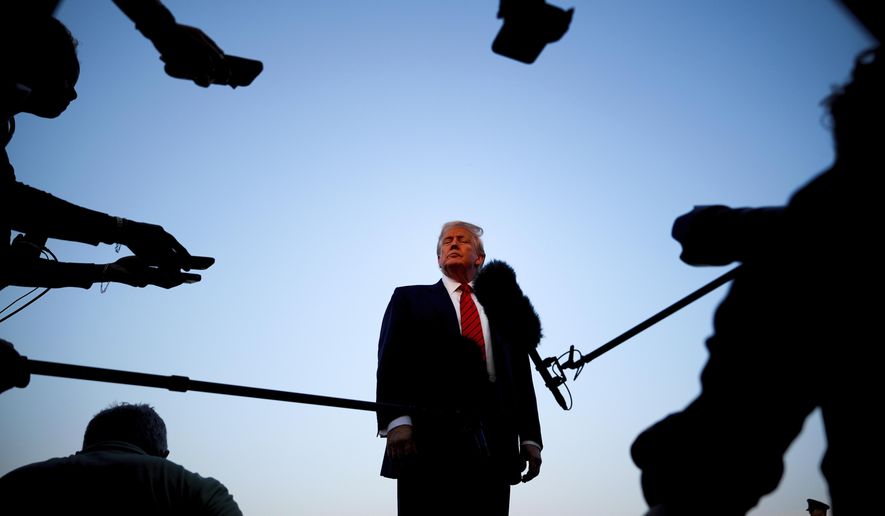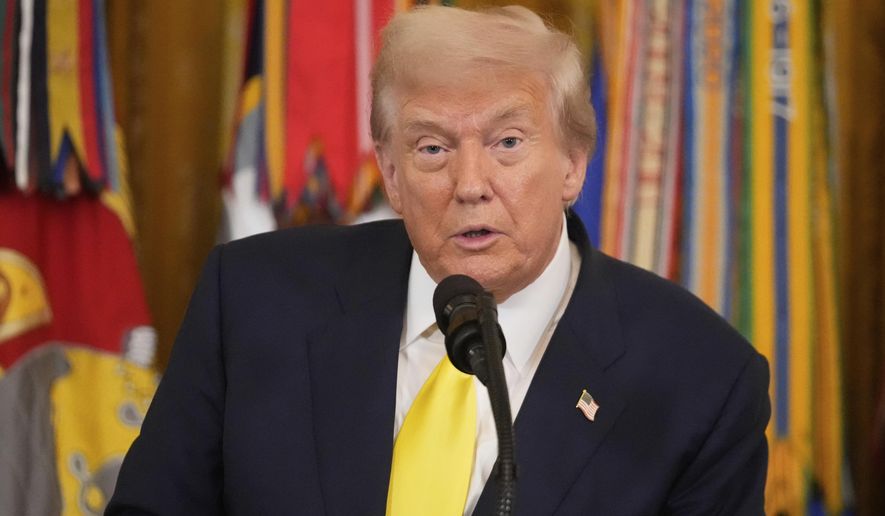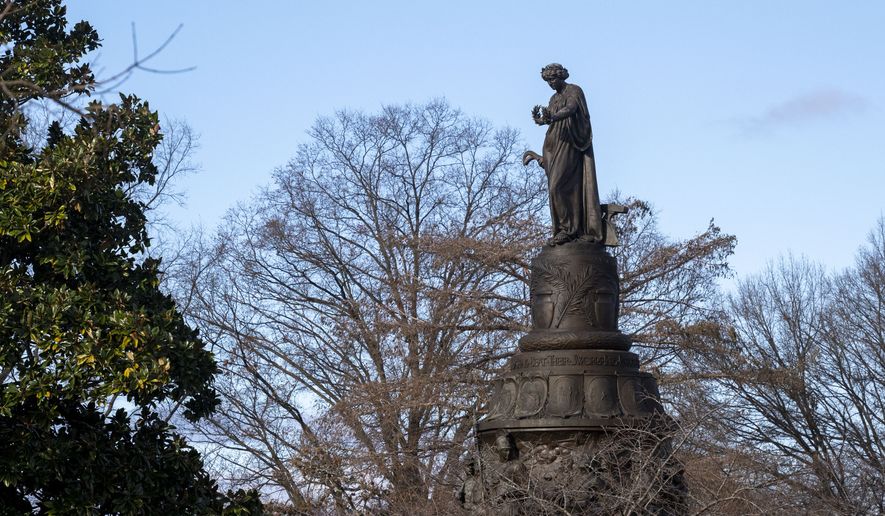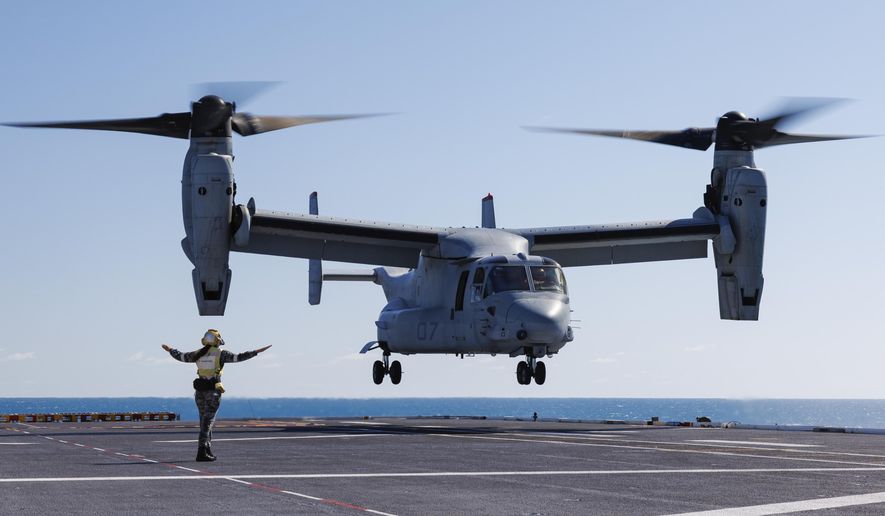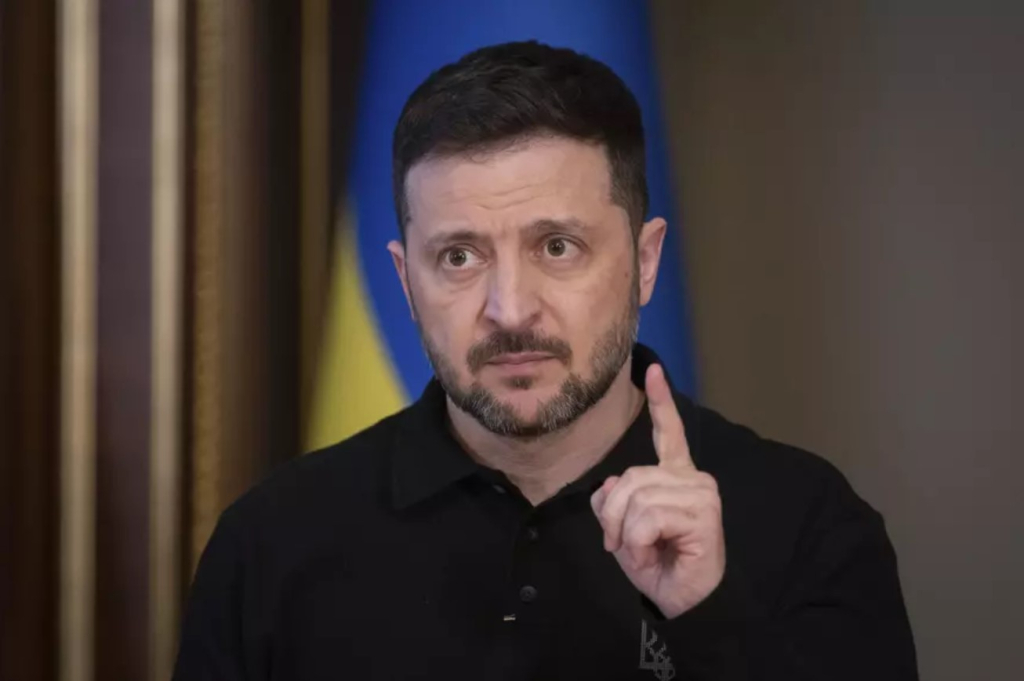
Seth McLaughlin & Matt Delaney | August 11, 2025
(The Washington Times) — Don’t expect either Russia or Ukraine to be “super happy” with the peace deal proposed by the U.S., Vice President J.D. Vance said, because President Trump is asking both countries to compromise to reach an agreement.
Meanwhile, European leaders are advocating for Ukrainian President Volodymyr Zelenskyy to join Mr. Trump at a Friday summit in Alaska with Russian leader Vladimir Putin.
Mr. Zelenskyy expressed gratitude for his allies’ support and urged a fair deal for his nation.
Earlier reporting hinted at the U.S. discussing Ukrainian land forfeitures to Russia to end the war, which is well into its fourth year.
Mr. Vance put to rest any idea that each side would get everything it wants from the peace talks but said Mr. Trump’s influence is the key to lowering the weapons for good.
“Both the Russians and the Ukrainians, probably, at the end of the day, are going to be unhappy with it,” Mr. Vance said in a prerecorded interview broadcast on Fox News’ “Sunday Morning Futures.” “But I don’t think you can actually sit down and have this negotiation absent the leadership of Donald J. Trump.”
Mr. Vance credited the president with removing “one of the most important logjams” in the war: the Russian president’s reluctance to meet with Mr. Zelenskyy.
The vice president said the Trump administration is working to arrange face-to-face talks between Mr. Putin and Mr. Zelenskyy so the two leaders can work out a deal that allows them to “live in relative peace, where the killing stops.”
NATO Secretary-General Mark Rutte said Mr. Trump’s high-stakes meeting with Mr. Putin will test whether the Russian leader is serious about ending the war in Ukraine.
Mr. Rutte said Mr. Trump has ratcheted up the pressure on Mr. Putin through increased tariffs on India over its reliance on Russian energy and agreeing to send lethal weapons to Ukraine.
“Next Friday, it will be important because it will be about testing Putin,” Mr. Rutte said Sunday on ABC’s “This Week.” “How serious is he about bringing this terrible war to an end?”
Mr. Rutte said Ukrainian and European leaders had “successful” talks Saturday with Mr. Vance in London in preparation for the Alaska summit.
He said he hopes the Trump-Putin meeting will lead to full-scale negotiations that address Ukraine’s security concerns and whether Ukraine would cede land as part of a peace deal.
“It will be, of course, about security guarantees, but also about the absolute need to acknowledge that Ukraine decides on its own future,” he said. “That Ukraine has to be a sovereign nation.”
Matt Whitaker, the United States ambassador to NATO, said Mr. Trump has the final say on whether Mr. Zelenskyy is invited to the meeting Friday.
“Yeah, I certainly think it is possible,” Mr. Whitaker said on CNN’s “State of the Union” when asked whether Mr. Zelenskyy could make an appearance. “Certainly, there can’t be a deal that everybody that is involved in doesn’t agree to.”
Ukrainian leaders have feared being left out of peace talks, and the negotiations have clear sticking points.
Indeed, Mr. Zelenskyy last week rebuffed Mr. Trump’s suggestion that Ukraine and Russia could swap some territory as part of a peace deal.
“The answer to the Ukrainian territorial question is already in the constitution of Ukraine,” Mr. Zelenskyy said in a video address Saturday morning. “No one will retreat from this, and no one can. Ukrainians will not give their land to the occupier.”
He said that any peace solution carved out “without Ukraine” amounts to “solutions against peace.”
The Russians also indicate little appetite for compromise. They are holding fast to demands that Russia retain its territorial gains and that Ukraine not be allowed to join NATO or host any Western troops.
Mr. Putin believes Russia has the upper hand in the war, with outgunned and outnumbered Ukrainian forces struggling to stem Russian advances in many sectors of the more than 600-mile front line while swarms of missiles and drones batter Ukrainian cities nightly.
In a memorandum presented at talks in Istanbul in June, Russia offered Ukraine two options for establishing a 30-day ceasefire. One demanded that Ukraine withdraw its forces from Donetsk, Luhansk, Zaporizhzhia and Kherson, the four regions Moscow illegally annexed in September 2022 but never fully captured.
As an alternate condition for a ceasefire, Russia made a “package proposal” for Ukraine to halt mobilization efforts, freeze Western arms deliveries and ban any third-country forces on its soil. Moscow also suggested that Ukraine end martial law and hold elections, after which the countries could sign a comprehensive peace treaty.
Once a truce is reached, Moscow wants a deal to include the “international legal recognition” of its annexations of Ukraine’s Crimean Peninsula in 2014 and the four regions in 2022.
European leaders rallied behind Ukraine, saying peace in the war-torn nation can’t be resolved without Kyiv.
Mr. Zelenskyy thanked European allies in a post on X, writing Sunday: “The end of the war must be fair, and I am grateful to everyone who stands with Ukraine and our people.”
Asked Thursday whether Moscow had signaled any willingness to compromise to make a meeting with Mr. Trump possible, Mr. Putin’s foreign affairs adviser, Yuri Ushakov, responded that the Russian position hadn’t shifted.
The memorandum that Ukraine presented to Moscow in Istanbul emphasized the need for a full and unconditional 30-day ceasefire to set the stage for peace negotiations.
It reaffirmed Ukraine’s consistent rejection of Russian demands for neutral status as an attack on its sovereignty, declaring it is free to choose its alliances and adding that its NATO membership will depend on consensus with the alliance.
It emphasized Kyiv’s rejection of any restrictions on the size and other parameters of its armed forces, as well as curbs on the presence of foreign troops on its soil.
Ukraine’s memorandum also opposed recognition of any Russian territorial gains while describing the current line of contact as a starting point in negotiations.
The document noted the need for international security guarantees to ensure the implementation of peace agreements and prevent further aggression.
Kyiv’s peace proposal also demanded the return of all deported and illegally displaced children and a total prisoner exchange.
It held the door open to gradual lifting of some of the sanctions against Russia if it abides by the agreement.







